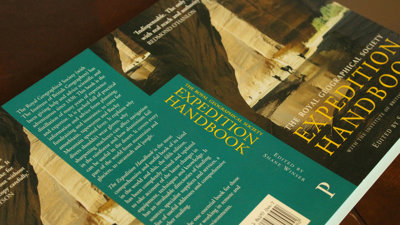The Royal Geographical Society Expedition Handbook
Edited by Shane Winser
Published by Profile Books in conjunction with the Royal Geographical Society, 2004. 502pp. ISBN I 86197 0447.
This essential guide to planning an expedition is packed full of practical information and advice for anyone planning a scientific, adventurous, or school expedition overseas. Although this book is now out of print, individual chapters are available as PDF downloads.
Section 1: Planning and organisation (chapters 1–6) gives advice on how to turn your dream into reality, and the leadership styles you might want to adopt in putting together your team. There are greater opportunities than ever before for people of all ages and abilities to take part in expeditions and fieldwork, and a new chapter offers approaches to providing an inclusive experience for those with disabilities. RGS-IBG particularly encourages host country participation on overseas projects, suggestions are provided on how this can be achieved. Practical issues relating to maps, navigation and catering are also addressed.
Section 2: Finance and fundraising (chapters 7–9) consists of three chapters suggesting a variety of ways to finance your chosen projects: Starting with the budget and techniques for financial management, right through to approaching grant-giving organisations and commercial companies for money and sponsorship. Charity fundraising expeditions which try to raise money for worth causes are now a regular occurrence and advice on these is also given.
Section 3: Safe and responsible expeditions (chapters 10–15) is essential reading. Preparing a formal risk assessment is a pre-requisite for any expedition and fieldwork, particularly those involving young people. There are chapters on the legal context to this, other aspects of expeditions in particular copyright, and on the recent UK government guidance on school visits, as well as vital information on Insurance and expedition medicine. A new chapter on minimising your impact on both the environment and the people amongst whom you work reflects the Society’s commitment to encouraging responsible expeditions.
Section 4: Expedition logistics (chapters 16–21) provides practical tips from a team of world class explorers, field scientists and travellers on living and working in mountains, hot deserts, tropical forests and polar environments, or undertaking caving, or underwater expeditions.
Section 5: Research projects (chapters 22–27) is intended to suggest possible topics for field research projects in a wide variety of different environments. It begins with a step-by-step guide to designing a research project and gives specific advice on research in tropical forests and wetlands, arid lands and savannas, in the tundra and periglacial regions of the world.
Section 6: Expedition transport (chapters 28–32) is about how to get the best out of 4x4 vehicles, bicycles, camel, horses and canoes to travel in remote and challenging environments.
Section 7: Recording your expedition (chapters 33–39) provides advice on how to communicate your findings and experiences through photography, sound recording, radio broadcasts and film-making, and gives tips on lecturing and writing-up your expedition report and scientific papers so that there is a lasting record of your achievements.
Important note: This book was published in 2004 so some of the information may have changed.
